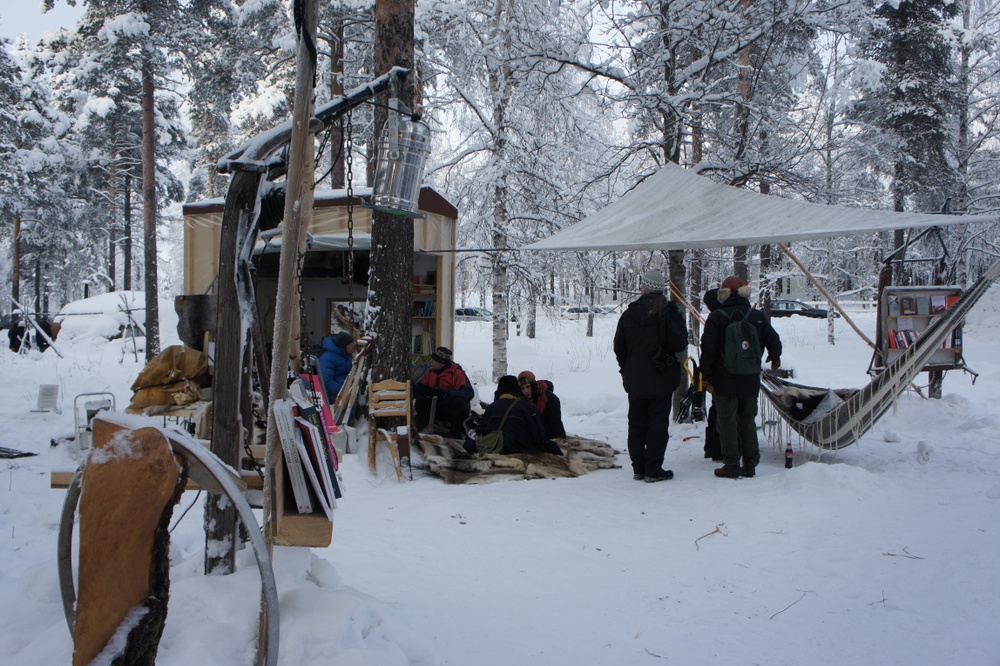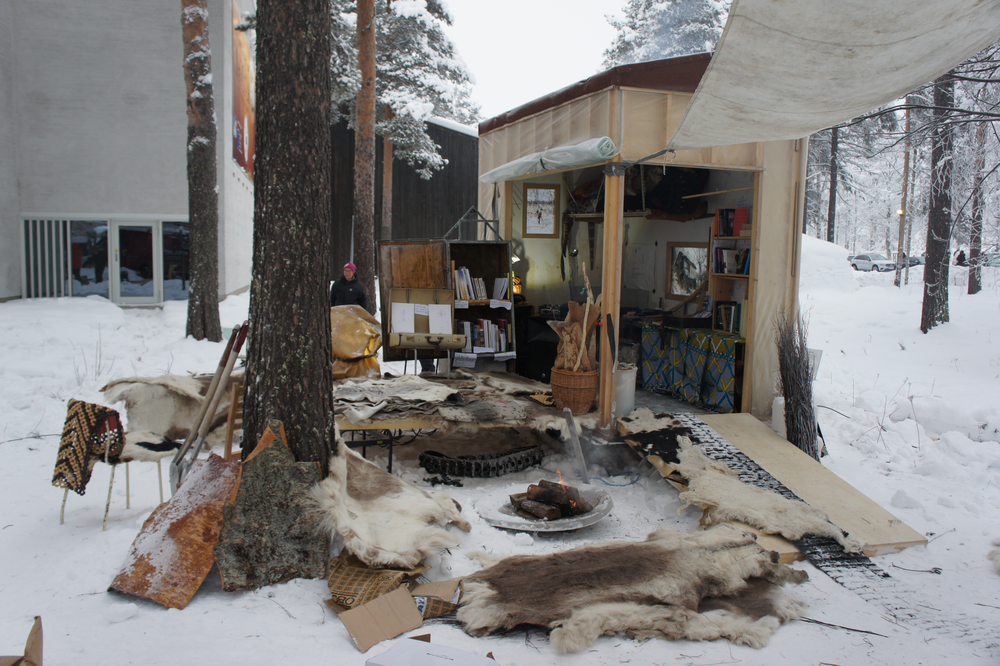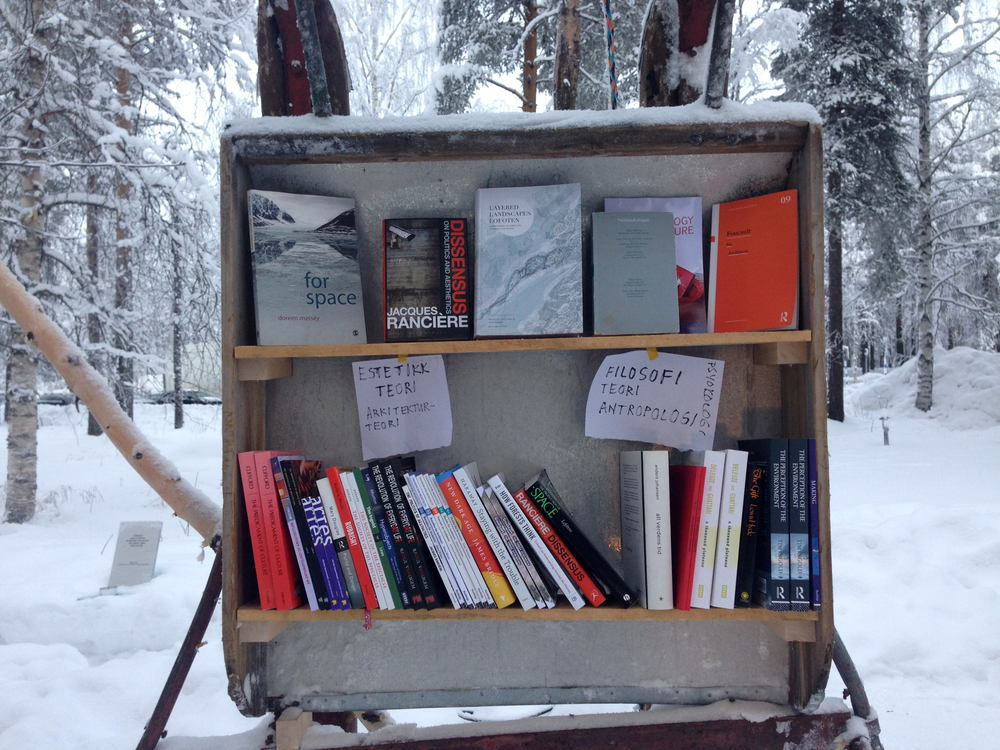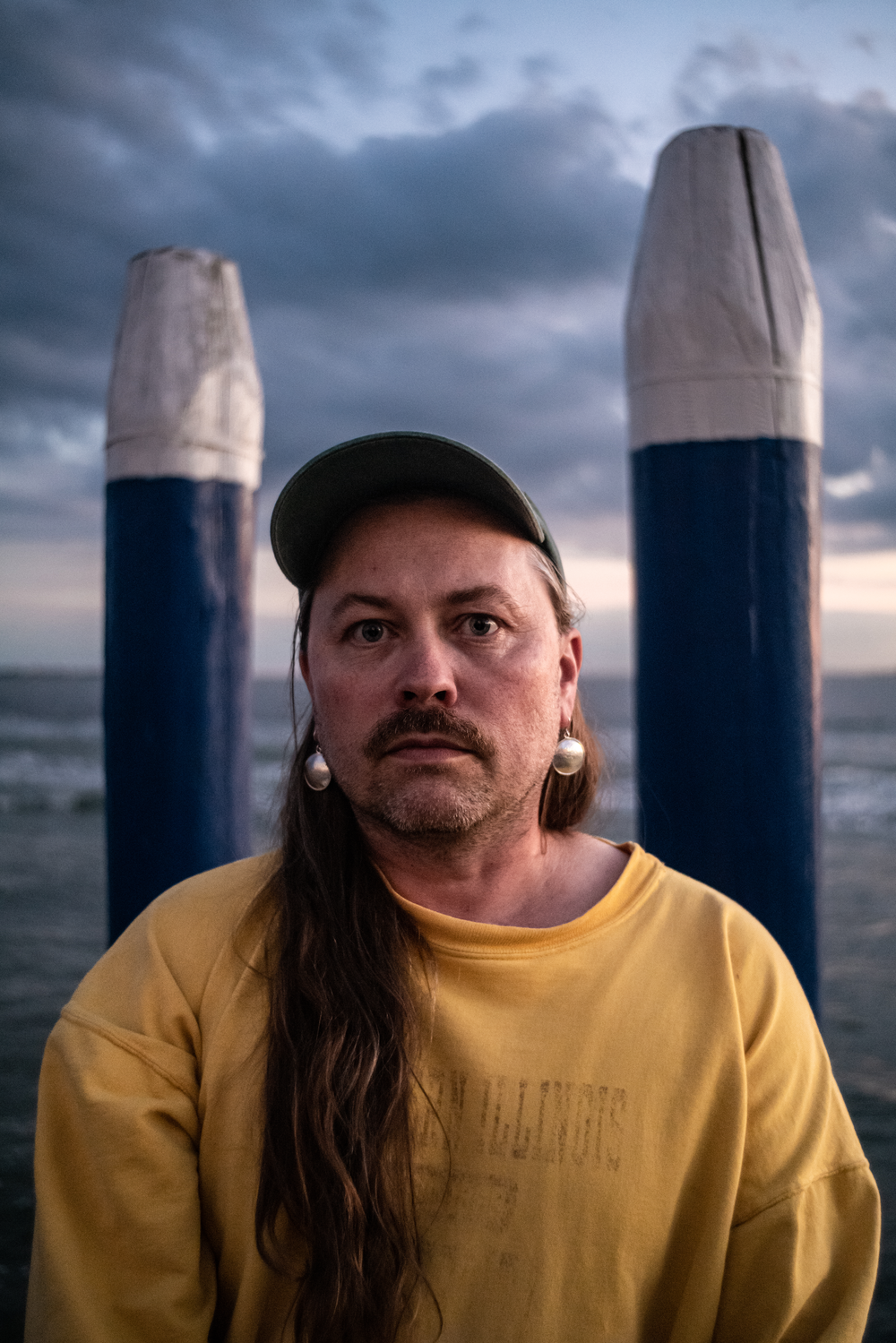Joar Nango's 'Girjegumpi', the Sámi Architecture Library, travels to Venice in 2023
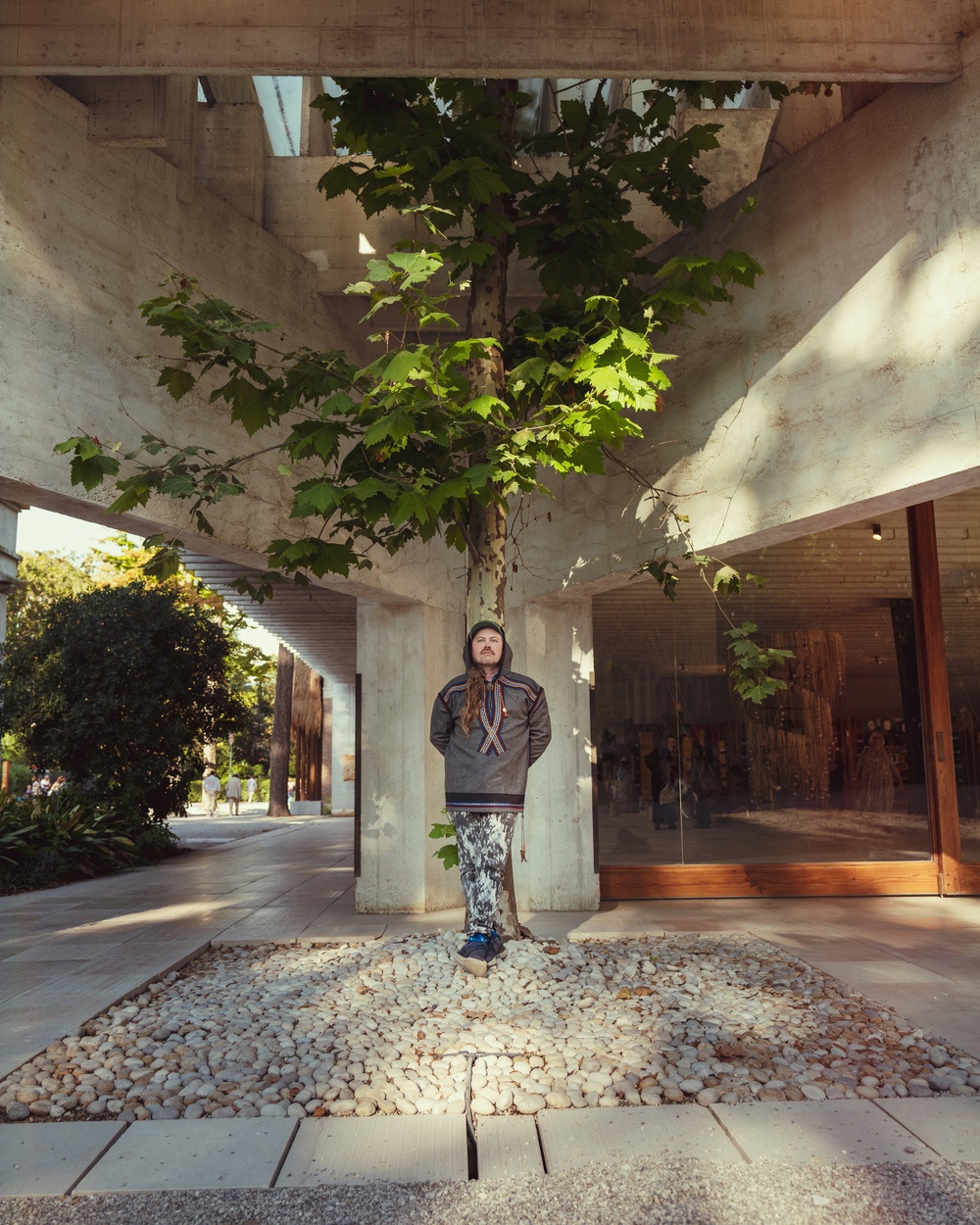 Joar Nango at the Nordic Countries Pavilion, Venice, 2022. Photo: Knut Åserud.
Joar Nango at the Nordic Countries Pavilion, Venice, 2022. Photo: Knut Åserud.For over fifteen years, architect and artist Joar Nango has been assembling an archive of books about issues relevant to Indigenous architecture. In 2018, Girjegumpi first opened to a public.
In 2023, this structure, social space, and source of knowledge around Sámi architecture will travel to the Nordic Countries Pavilion at the 18th International Architecture Exhibition – La Biennale di Venezia in Venice. The pavilion officially represents Finland (Arkkitehtuurimuseo, Helsinki), Norway (Nasjonalmuseum, Oslo), and Sweden (ArkDes, Stockholm).
Girjegumpi is a spatialisation of conversations and research initiated by Joar Nango over two decades of practice at the intersection of architecture and art. As an itinerant, collective library, the project has evolved and expanded as it has travelled. This journey involves multiple collaborations, including artists and craftspeople such as Katarina Spik Skum, Anders Sunna, and Ken Are Bongo.
Central to Girjegumpi is the archive that it contains and shares – from rare titles to contemporary books, the collection of more than 500 editions embraces topics such as Sámi architecture and design, traditional and ancestral building knowledge, activism, and decoloniality. As a gathering space, it hosts large groups of people. As a reading room, it offers an environment for solitary study and reflection. As a critical project, it builds spaces for Indigenous imagination.
Nomadic by design, Girjegumpi is a living project addressing the relevance of Indigenous culture in architectural discourse and construction today: the importance of collaborative work, building techniques and use of resources in rapidly changing climate conditions, the use of locally grounded material flow and sensitive approaches to landscapes and nature. It highlights the architect’s position towards a more polyphonic understanding of the world.
In 2023, Girjegumpi travels to the Nordic Pavilion at the 18th International Architecture Exhibition – La Biennale di Venezia. The pavilion, designed by Sverre Fehn in 1962, was conceived to represent forms of cooperation across the Nordic countries. In this context, Girjegumpi opens to an international audience to continue building bodies of knowledge, collaboration and solidarity that transcend national boundaries.
Joar Nango, Girjegumpi in Jokkmokk, 2018. Photo: Astrid Fadnes
About Girjegumpi
The word Girjegumpi is derived from two Northern Sámi words: ‘Girji’, meaning book, and ‘Gumpi’ – a small mobile reindeer herder cabin on sledges, often pulled by a snowmobile. This wordplay refers to a library, an archive, and the construction in which these are stored and transported.
Girjegumpi has unfolded in many locations since 2018. When it is not travelling, it is based at the Sámi Dáiddaguovddáš (Sámi Centre for Contemporary Art) in Kárášjohka/Karasjok. A sister version of Girjegumpi is held by the National Gallery of Canada in Odàwàg/Ottawa.
Joar Nango, Girjegumpi in Jokkmokk, 2018. Photo: Astrid Fadnes
Girjegumpi collaborators include, among others:
Katarina Spik Skum, Anders Sunna, Petter Tjikkom, Håvard Arnhoff, Mathias Danbolt, Tobias Aputsiaq Prytz, Astrid Fadnes, Eirin Hammari, Anne Henriette Nilut, Ken Are Bongo, Ole-Henrik Einejord, Anders Rimpi, Grete Johanna Minde, Magnus Antaris Tuolja, Ole Thomas Nilut, Četil Somby, SDG, FINN, Ájtte, Arne Terje Sæther, Eystein Talleraas, Tone Huse, Anna Stina Svakko, Anne Kare Kemi, Petri Henriksson, Katrine Rugeldal, Robert Julian Hvistendahl.
Timeline and Locations of Girjegumpi:
- 2018: Hárstták/Harstad, Arctic Arts Festival; Márkomeannu, Sámi Culture and Music Festival; Kárášjohka/Karasjok, Sámi Dáiddaguovddáš (Sámi Centre for Contemporary Art)
- 2019: Dálvvadis/Jokkmokk, Jokkmokk’s Market; Gällivare; Ottawa, National Gallery of Canada
- 2020: Bergen, Bergen Kunsthall; Kárášjohka/Karasjok, Sámi Dáiddaguovddáš (Sámi Centre for Contemporary Art); Virtual Girjegumpi, ArkDes
- 2021: Hárstták/Harstad, Arctic Arts Festival; Kárášjohka/Karasjok, Sámi Dáiddaguovddáš (Sámi Centre for Contemporary Art); Oslo, Nasjonalmuseet Norway
- 2022: Helsinki, Kiasma, ARS22; Montréal, Canadian Centre for Architecture, ᐊᖏᕐᕋᒧᑦ / Ruovttu Guvlui / Towards Home; Kárášjohka/Karasjok, Sámi Dáiddaguovddáš (Sámi Centre for Contemporary Art
- 2023: Nordic Countries Pavilion, 18th International Architecture Exhibition – La Biennale di Venezia
Joar Nango, Girjegumpi in Jokkmokk, 2018. Photo: Astrid Fadnes
About Joar Nango
Joar Nango (born in 1979, Áltá) is an architect and artist based in Romsa/Tromsø, Norway. His work is rooted in Sápmi – the traditional Sámi territory covering the northern regions of Norway, Sweden, Finland and the Kola Peninsula in Russia. Through building, site-specific interventions, design collaborations, photography, publications and video, Nango’s work explores the role of Sámi and Indigenous architecture and craft in contemporary thought.
Nango’s work, including the long-term project Girjegumpi, is nurtured by parallel collaborations with other artists, architects, and craftspeople. Among many other initiatives across two decades of practice, he is a founding member of the architecture collective FFB (2010). Currently, he is collaborating with choreographer and director Elle Sofe Sara on a dance performance with Carte Blanche, premiering at the Norwegian National Opera and Ballet. Following a winning proposal in 2021, Nango alongside Snøhetta, Econor, and 70°N arkitektur are designing the new Sámi National Theatre and Sámi High School and Reindeer Husbandry School in Guovdageaidnu/Kautokeino, currently under construction.
Trained at the Norwegian University of Science and Technology (NTNU) in Trondheim, Nango graduated in Architecture in 2008. Since then, his work has been presented at documenta 14, Bergen Kunsthall, National Museum Oslo – Architecture, Canadian Centre for Architecture, Sámi Dáiddaguovddáš (Sámi Centre for Contemporary Art), and Kiasma.
Joar Nango in Venice, 2022. Photo: Knut Åserud
About the Nordic Countries Pavilion at the 18th Biennale Architettura
The International Architecture Exhibition – La Biennale di Venezia takes place every two years in Venice, Italy. The Nordic Countries Pavilion officially represents Finland, Norway and Sweden. The 18th International Architecture Exhibition, which will take place between 20 May and 26 November 2023, is curated by Lesley Lokko.
In 2023, ArkDes is commissioner and Nasjonalmuseum (Oslo, Norway) and Arkkitehtuurimuseo (Museum of Finnish Architecture, Helsinki, Finland) are deputy commissioners.
In 2018, Eero Lundén presented Another Generosity. In 2021, Helen & Hard and presented What We Share. In 2022, during the Biennale Arte, the Nordic Countries Pavilion transformed into presented the exhibition entitled The Sámi Pavilion with a project commissioned by Office for Contemporary Art Norway (OCA) with Museum of Contemporary Art Kiasma / The Finnish National Gallery and Moderna Museet, featuring the artists Pauliina Feodoroff, Máret Ánne Sara, and Anders Sunna.
Notes to Editors
Complete and updated information about the 18th Biennale Architettura can be found here.
Information about the architecture of the Nordic Countries Pavilion can be found here.
See an announcement interview with Joar Nango on our website.
For more information: maria.ostman@arkdes.se
About ArkDes
ArkDes is Sweden’s national centre for architecture and design. It is a museum, a study centre and an arena for debate and discussion about the future of architecture, design and citizenship.
Contacts
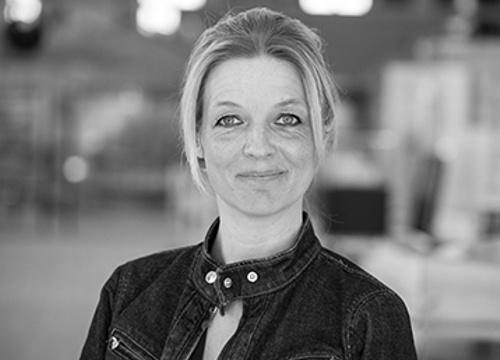
Maria Östman
- maria.ostman@arkdes.se
- +46 73 273 36 00
